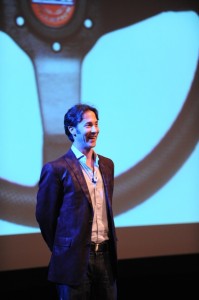NSU Newsroom
SharkBytes
Horizons
This version of NSU News has been archived as of February 28, 2019. To search through archived articles, visit nova.edu/search. To access the new version of NSU News, visit news.nova.edu.
This version of SharkBytes has been archived as of February 28, 2019. To search through archived articles, visit nova.edu/search. To access the new version of SharkBytes, visit sharkbytes.nova.edu.
Neuroscientist David Eagleman Reveals the Brain’s Secret Lives at On-Campus Talk

Neuroscientist David Eagleman, Ph.D., tells audience members that they forgot to signal a turn and likely drove their imaginary car off the road during his driving visualization experiment.
“The human brain is the most complicated thing in the universe,” said neuroscientist David Eagleman, Ph.D., to a crowd of more than 450 students, faculty, and members of the NSU community. Eagleman spoke at NSU on Apr. 19, as part of the Distinguished Speakers Series, hosted by the Farquhar College of Arts and Sciences.
“You’re not aware of most of what your brain is doing,” Eagleman said. “The conscious mind gives you the bottom line of what’s happening in your life. Meanwhile, the unconscious mind does all the work.”
Eagleman titled the evening’s talk after his 2011 best-selling book, Incognito: The Secret Lives of the Brain. The thought-provoking and insightful keynote also included interactive experiments. For example, audience members viewed two virtually identical images, but with one photo containing what should’ve been an obvious difference. Still, only a small percentage of audience members could spot the changes.
“You don’t see most of what hits your eyes,” Eagleman noted during the optical-illusion experiments.
In another demonstration, Eagleman asked audience members to visualize themselves driving and to demonstrate how they’d turn their car. Few people, however, remembered to signal and most would’ve driven off the road based on the movements of their hands, according to the neuroscientist.
When Eagleman encouraged audience members to consciously think about other everyday tasks they perform, such as signing your name, some lost sight of how to complete the simple actions. According to Eagleman, the minute you start to think about your unconscious brain’s activity—the elaborate processes that enable you to perform trivial tasks—you start to lose track of what you’re doing, and sometimes struggle to complete the otherwise routine action.
Eagleman also discussed synesthesia, a condition that affects a person’s perception. A person with synesthesia may perceive the world through unexpected sensory experiences, such as seeing a specific color when seeing or thinking of a specific number, letter, day, or month. Eagleman explores this idea at length in his co-authored book, Wednesday is Indigo Blue.
Although synesthesia affects people in different ways and to varying degrees, Eagleman said most people experience similar responses to certain sensory stimuli. To illustrate this point, he showed that many people describe a low musical note on the piano as sounding “dark” and a higher note “bright,” even though color shades have no direct bearing on sound.
All of Eagleman’s “ah-ha”-inducing examples and demonstrations served to showcase his fascination and scientific involvement with the complex brain. Although Eagleman said that brains are like fingerprints, in that no two are identical, one idea remains constant in his mind: “We have found the most wondrous thing in the universe, and it is us.”
Following his talk, Eagleman answered a variety of questions from audience members before holding a meet-and-greet and book signing. Prior to the evening’s keynote, he led a seminar with students from the Undergraduate Honors Program and the college’s Division of Math, Science, and Technology, which hosted the event.
Visit the college’s Photo Gallery to view pictures from David Eagleman’s talk.